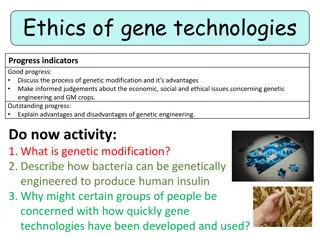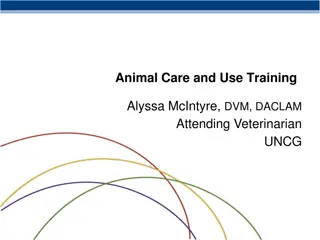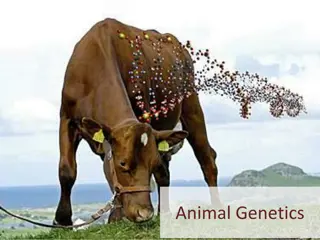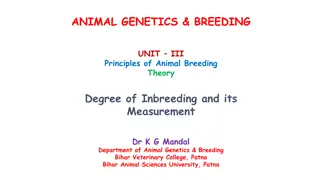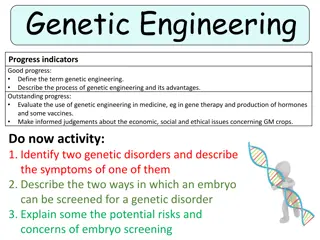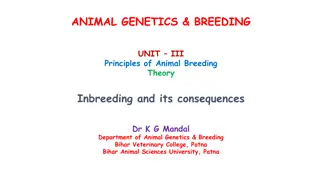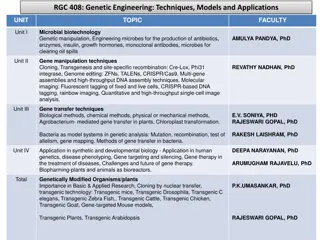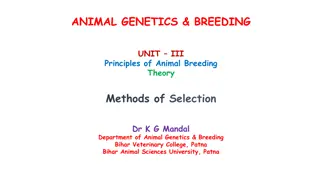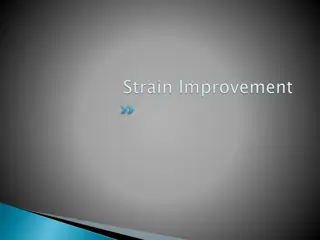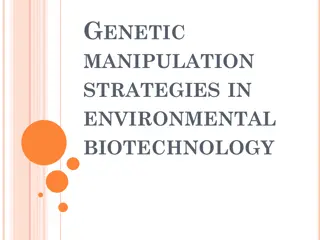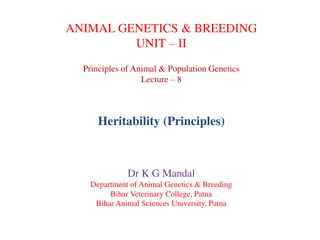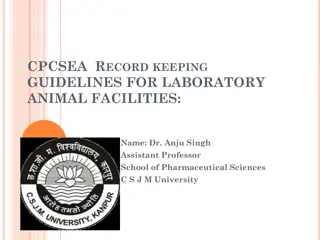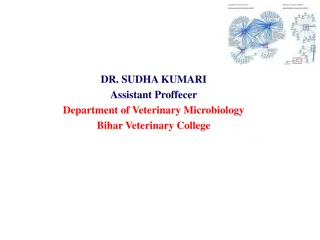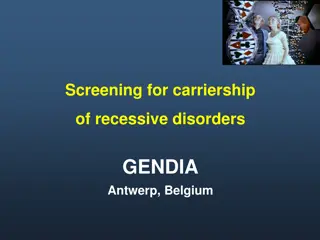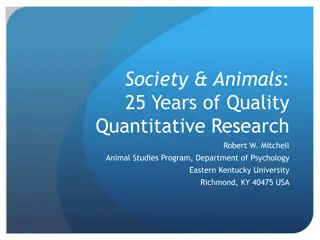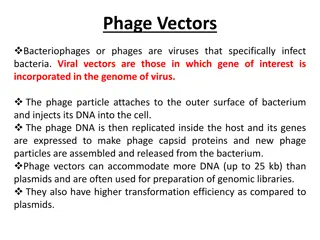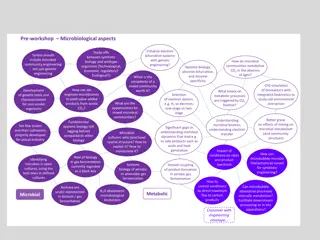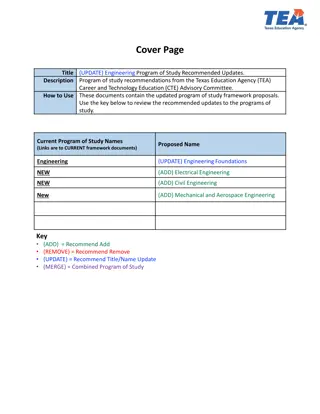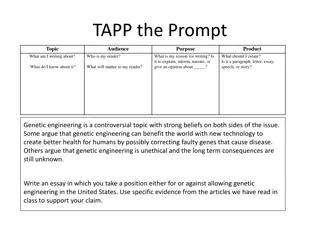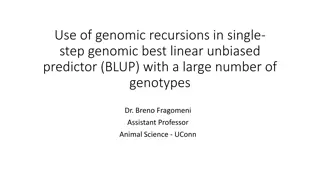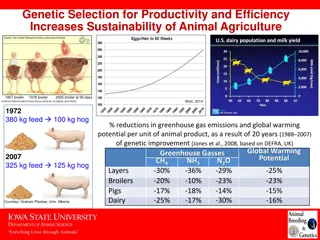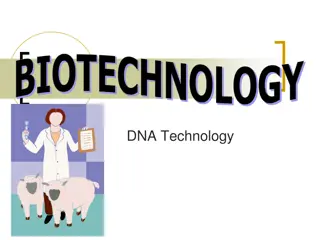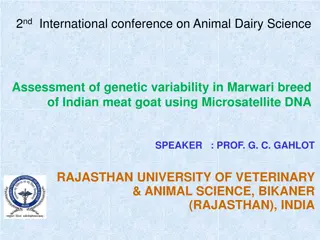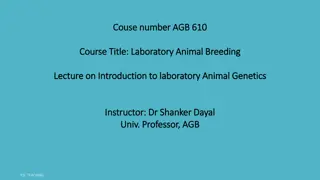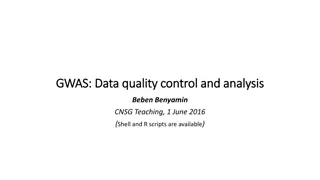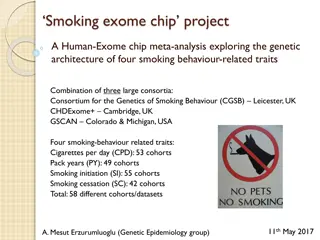Responsibilities of Facility Animal Care Committee at McGill University
The Facility Animal Care Committee (FACC) at McGill University oversees animal activities, ensures ethical treatment of animals, and adheres to guidelines from organizations such as the Canadian Council on Animal Care (CCAC). Responsibilities include continual oversight of animals, approving care pr
1 views • 13 slides
Animal Welfare and Ethics: Standards and Regulations in India
The content covers a wide range of topics related to animal welfare, ethics, and laws in India. It delves into the definition of animal welfare, the role of veterinarians, animal welfare organizations, regulations like the Prevention of Cruelty to Animals Act, and protection of wildlife, working ani
0 views • 15 slides
Exploring the Pros and Cons of Genetic Engineering
Delve into the world of genetic modification, uncovering its advantages such as potential breakthroughs in treating inherited disorders and improved crop quality. However, concerns include unknown long-term health impacts, environmental risks, and ethical dilemmas. Engage with various viewpoints thr
0 views • 11 slides
Overview of Human Genetic Disorders
Human genetic disorders encompass a range of conditions, from recessive disorders like cystic fibrosis to dominant disorders such as Huntington's disease. Examples include cystic fibrosis, Huntington's disease, and sickle-cell anemia. Understanding genetic disorders involves research and awareness o
0 views • 10 slides
Exploring Cellular Chassis in Synthetic Biology
Assumptions about cell behavior are challenged when different strains are transformed with DNA to grow in colorful ways. Synthetic Biology uses genetic engineering to construct living systems, introducing students to molecular techniques in an engineering context. Activities such as iTUNE Device and
0 views • 24 slides
Importance of Training in Animal Care and Use for Research
Training in animal care and use is essential to ensure humane and appropriate treatment of research animals, promote regulatory compliance, and uphold high standards of science and animal well-being. The presentation covers the necessity of training, goals including reviewing animal use and identify
0 views • 53 slides
Understanding Animal Genetics: A Comprehensive Overview
Animal genetics is the study of heredity, inheritance of traits from parents to offspring, genetic material like DNA, chromosomes, genes, alleles, and nucleotides. It involves the understanding of chromosomes in different livestock species, DNA as the carrier of genetic information, genes as units o
0 views • 67 slides
Understanding Degree of Inbreeding in Animal Genetics and Breeding
Degree of inbreeding refers to the extent to which an individual carries genes identical by descent. This concept is crucial in animal breeding as it affects genetic diversity and homozygosity in offspring. The coefficient of inbreeding is used to measure the level of inbreeding, with higher values
1 views • 30 slides
Understanding the Difference: Animal Rights vs. Animal Welfare
Explore the nuanced distinction between animal rights and animal welfare, delving into the ethical considerations, philosophies, and advocacy efforts surrounding these concepts. Discover how animal rights proponents emphasize the equal rights of animals, while animal welfare focuses on humane treatm
0 views • 36 slides
Exploring Genetic Engineering: From Basics to Applications
Genetic engineering involves altering the genetic material of organisms to achieve desirable traits. This process entails cutting out specific genes from one organism and transferring them to another. In medicine, genetic engineering finds applications in gene therapy, hormone production, and vaccin
0 views • 12 slides
Understanding Genetic Markers in Molecular Mapping
Genetic markers play a crucial role in gene mapping within molecular biotechnology. They are fragments of DNA associated with specific genomic locations, aiding in identifying DNA sequences and analyzing genetic variation. Various types of genetic markers such as RFLP, SSR, and SNP offer insights in
1 views • 26 slides
Understanding Inbreeding in Animal Genetics & Breeding
Explore the principles of animal breeding theory focusing on inbreeding and its consequences, including examples like selfing, full-sib mating, and genetic effects. Learn about close breeding, line breeding, and genetic consequences of inbreeding in animal populations. Discover how inbreeding affect
0 views • 13 slides
Understanding Genetics: Mutations, Chromosomal Aberrations, and Genetic Engineering
Genetic mutations can be harmless, harmful, or beneficial, leading to variations within a species. Examples of gene mutations and chromosomal aberrations, like Trisomy 21, illustrate genetic abnormalities. The increase in Down Syndrome cases with maternal age highlights a maternal age effect. Geneti
0 views • 17 slides
Genetic Engineering: Techniques, Models, and Applications in Microbial Biotechnology and Plant Genetics
This document explores genetic manipulation, gene manipulation techniques, gene transfer techniques, applications in synthetic and developmental biology, genetically modified organisms/plants, plant tissue culture, micropropagation of plants, genetics in evolution, and genetics in crop improvement m
0 views • 5 slides
Exploring Genetic Engineering: A Journey into Manipulating Organisms
Delve into the world of genetic engineering, where organisms' genetic makeup is altered for various purposes. Discover the process of modification, the history of genetic manipulation, and the impact of genetically modified organisms on society and science.
0 views • 20 slides
Principles of Animal Breeding Theory and Methods of Selection
Animal breeding involves selecting for desirable traits to improve the overall merit of animals. Methods such as tandem selection and multi-trait selection are used to enhance genetic progress. Economic value, genetic significance, and selection criteria play important roles in the breeding process.
1 views • 16 slides
Improving Microbial Productivity and Characteristics for Industrial Applications
Efforts to enhance the productivity of natural isolates for commercial products involve genetic modifications through mutation, genetic recombination, and genetic engineering techniques. Desired characteristics include genetic stability, efficient production, versatility in carbon sources, and ease
1 views • 25 slides
Genetic Manipulation in Environmental Biotechnology
Genetic manipulation strategies in environmental biotechnology involve techniques like gene splicing and molecular cloning to modify genes directly. These methods have various applications such as isolating genes, producing specific molecules, improving biochemical production, creating organisms wit
0 views • 20 slides
Understanding Heritability in Animal Genetics and Breeding
Heritability is a crucial concept in animal genetics and breeding, indicating the proportion of total phenotypic variance attributed to genetic effects. It helps in predicting breeding values, assessing relationships between individuals, and guiding genetic determinations. Properties of heritability
2 views • 20 slides
Laboratory Animal Facilities Record-keeping Guidelines
Guidelines for maintaining records in laboratory animal facilities include provisions for animal housing, staff records, health monitoring, and standard operating procedures. Compliance with CPCSEA regulations ensures ethical review procedures for animal research proposals. Focus is on providing a s
6 views • 11 slides
Understanding Bacterial Transformation in Molecular Biology
Transformation in molecular biology is a process where genetic material is altered by the uptake of exogenous DNA. It involves the direct incorporation of genetic material into a cell, leading to genetic changes. This phenomenon was first demonstrated by Frederick Griffith in 1928. The process of tr
1 views • 25 slides
Understanding Genetic Counselors and the NSGC
Genetic counselors play vital roles in healthcare by assisting patients with genetic conditions, advocating for their needs, educating providers, conducting research, and influencing public policy. The National Society of Genetic Counselors (NSGC) supports genetic counselors in their professional en
3 views • 12 slides
Genetic Carrier Screening for Recessive Disorders by GENDIA, Antwerp, Belgium
Explore the world of genetic carrier screening offered by GENDIA in Antwerp, Belgium. Learn about prenatal screening for various genetic disorders, including Down syndrome and severe monogenic disorders. Discover the frequency of common recessive disorders and the severity of genetic diseases. Uncov
0 views • 17 slides
Exploring Human-Animal Interactions through 25 Years of Quality Research
Delve into the interdisciplinary realm of human-animal interactions with a focus on social sciences and quantitative research. Discover key themes such as social psychology, therapy, animal welfare, and more. Explore attitudes and personality differences related to animal treatment, empathy, and bel
1 views • 26 slides
Understanding the Key Articles of the Nagoya Protocol on Access to Genetic Resources and Benefit-Sharing
The Nagoya Protocol aims to promote fair sharing of benefits from genetic resources utilization for conservation efforts. It encompasses access, technology transfer, funding, and respect for rights over resources and technologies. The protocol applies to genetic resources, traditional knowledge, and
1 views • 19 slides
Understanding Phage Vectors in Genetic Engineering
Phage vectors, utilized in genetic engineering, are bacteriophages capable of incorporating genes of interest into their genome. They have a higher DNA capacity compared to plasmids, making them ideal for creating genomic libraries. Bacteriophages like Lambda and M13 are commonly used for cloning ve
0 views • 17 slides
Advancing Microbiological Systems Through Genetic Engineering and Microbial Community Engineering
Exploring the intersection of genetic engineering and microbial community engineering to enhance electron bifurcation systems. Addressing trade-offs between synthetic biology and wildtype organisms, incorporating microbial community engineering in Synbio, and investigating CO2 metabolism in the abse
0 views • 8 slides
Recommended Updates for Engineering Program of Study
The Engineering Program of Study recommendations from the Texas Education Agency (TEA) Career and Technology Education (CTE) Advisory Committee include updates to various fields such as Electrical Engineering, Civil Engineering, and Mechanical and Aerospace Engineering. The proposed program framewor
0 views • 5 slides
Evolutionary Computation and Genetic Algorithms Overview
Explore the world of evolutionary computation and genetic algorithms through a presentation outlining the concepts of genetic algorithms, parallel genetic algorithms, genetic programming, evolution strategies, classifier systems, and evolution programming. Delve into scenarios in the forest where gi
0 views • 51 slides
Debating Genetic Engineering: Ethics & Advancements
Delve into the contentious topic of genetic engineering, exploring the ethical dilemmas and potential benefits it presents. Take a stance either supporting or opposing genetic engineering in the United States, backed by evidence from class readings. Craft a compelling argumentative essay that captiv
0 views • 8 slides
Genomic Recursions in Genomic BLUP for Animal Breeding
Explore the application of genomic recursions in single-step genomic best linear unbiased predictor (BLUP) for genetic evaluations in animal breeding. Understand the significance of using genomic data to improve genetic selection, increase accuracy, shorten generation intervals, and enhance genetic
0 views • 31 slides
Understanding Genetic Engineering and Genetic Variation
Genetic engineering plays a crucial role in manipulating genes to produce desired traits in organisms. Concepts like the origin of genetics, laws of segregation and independent assortment, and nucleic acid structure are fundamental in this field. Understanding the difference between the nuclei of eg
0 views • 50 slides
Advancements in Genetic Selection for Sustainable Animal Agriculture
The evolution of genetic selection in animal agriculture has significantly enhanced productivity and efficiency, leading to reductions in greenhouse gas emissions and global warming potential. Various studies highlight the positive impact of genetic improvement on broilers, pigs, and dairy animals.
0 views • 5 slides
Understanding Biotechnology: From Ancient Techniques to Modern Genetic Engineering
Biotechnology is the study of utilizing tools from living organisms to develop new products and processes for the benefit of society. It encompasses ancient practices like fermentation to modern genetic engineering techniques, such as manipulating genetic information in organisms. The Human Genome P
0 views • 31 slides
Overview of Genetic Variability in Marwari Breed of Indian Meat Goat
The presentation at the 2nd International Conference on Animal Dairy Science discussed the assessment of genetic variability in the Marwari breed of Indian meat goat using Microsatellite DNA by Prof. G.C. Gahlot from Rajasthan University of Veterinary & Animal Science, Bikaner. The global goat popul
0 views • 19 slides
Understanding Laboratory Animal Genetics and Research Importance
This course (AGB 610) delves into the realm of laboratory animal breeding, exploring the significance of using animals in research and teaching. Dr Shanker Dayal, a distinguished professor, guides students through lectures on animal genetics and the common uses of laboratory animals. The course emph
0 views • 14 slides
System Engineering Division Monthly Meeting Summary - May 26, 2022
The System Engineering Division Monthly Meeting on May 26, 2022, featured discussions on USD Research & Engineering, Mission Engineering Initiatives, Digital Systems Engineering, Committee Reports, and Updates. Presenters included key figures such as Holly Dunlap, Marc Goldenberg, Dr. Judith Dahmann
0 views • 51 slides
Overview of HL7 V2 Genetics Messaging and LOINC Genetic Testing Codes
This content delves into the proposed HL7 V2 genetics message, NLM forms builder, UCUM validator, and the current state of genetic testing codes in LOINC. It discusses the types of molecular genetic tests present in LOINC and the evolution towards newer genetic tests. The content also covers how LOI
0 views • 21 slides
Understanding GWAS: A Brief Overview of Genetic Association Studies
GWAS, or Genome-Wide Association Studies, are a method used to map genes associated with traits or diseases by analyzing genetic markers throughout the genome. This process involves statistically testing the association between SNPs and traits using regression or chi-squared tests in a hypothesis-fr
0 views • 19 slides
Genetic Architecture of Smoking Behavior Traits: Meta-Analysis Insights
Exploring the genetic basis of smoking behavior-related traits through a meta-analysis combining data from three large consortia across 58 different cohorts/datasets. The study investigates genetic variants associated with cigarettes per day, pack years, smoking initiation, and smoking cessation. Ov
0 views • 34 slides


